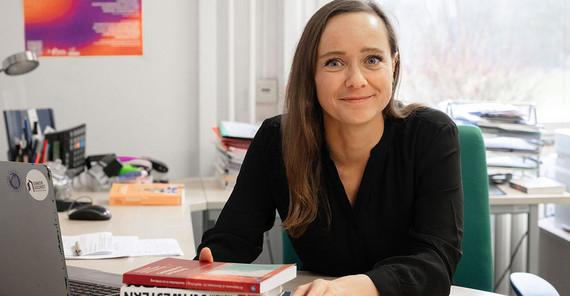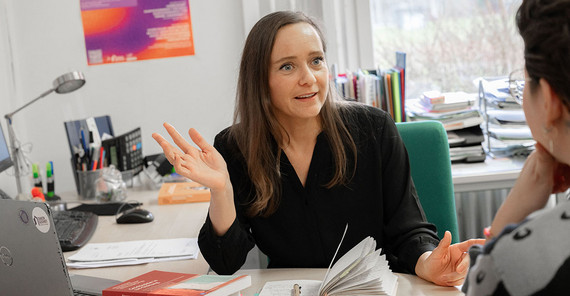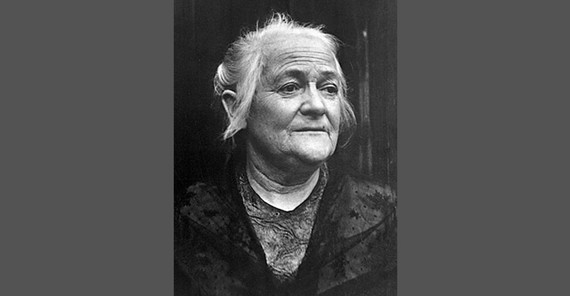Would you be happy to receive a bouquet of flowers on March 8?
March 8 is a day on which we celebrate women. Every year I receive many emails from university members asking why I call it “Feminist Day of Struggle.” I think the day is important to remember women's struggles and achievements, but there is still a lot to do: All over the world, women are exposed to violence, but are also affected by the gender pay and care gap. I deliberately use the term “Feminist Day of Struggle” to include people who do not identify as women and who experience classism, ableism, racism, and other forms of discrimination. After all, "women" are not a homogeneous group. The term goes back to the women workers' movement at the beginning of the 20th century. They spoke of the "Women's Day of Struggle". Their aim was to unite women from all walks of life, from factory workers to middle-class housewives. I still find it important today to emphasize the idea of solidarity. That's why my motto for this year is “Team up!”: We all need to tackle inequalities together, we also need men for this fight.
That is why I don't quite understand the metaphor with the flowers. What are the flowers for? For the fact that I am paid less, don't get into management positions, do more care work? I will gladly accept flowers on any other day. It is better to take to the streets together on Women's Day.
You have been the Central Equal Opportunity Commissioner at the University of Potsdam for almost six years now. What was the biggest challenge you had to overcome during this time?
I am not only the Central Equal Opportunity Commissioner, but also head of the Equal Opportunity Coordination Office (KfC). I also work closely with the decentralized Equal Opportunity Officers at the faculties, the central and academic institutions, the central university administration, and the University Library. These people are my greatest asset: The more people we are, the more we can stick together. However, it is a challenge to pass on knowledge and motivate everyone in such a large team. And filling all of these different roles is a balancing act: As Equal Opportunity Commissioner, I have a clear legal mandate to advise the President. At the same time, I have my ear to the ground and find out how university members are doing in individual consultations. And I also work very strategically as part of the administration. It is important to make prudent decisions time and again, but never lose sight of the goal when you encounter resistance.
When it comes to projects, the biggest challenge was probably the anti-discrimination guidelines, which we adopted in 2022 after two years of work. They arose from the need to create complaint structures, especially for students. Previously, it was not at all clear to those affected who they could turn to in the event of sexual harassment, racial discrimination, or abuse of power. We first had to define these terms, make sure that people find the guidelines, and trust that they work. It is still a process.
What are you proud of?
Quite a lot, actually. Most of all that our work for equal opportunity at the UP is so visible. I have noticed that many are very aware of our office, including students; that we are very well accepted by the university’s management and that we have been able to increase the proportion of women in professorships and maintain it so far. And I am proud that we have managed to establish good diversity and anti-discrimination work. For me, it's like a jigsaw puzzle where we put more and more pieces together to form the big picture. In contrast to many American universities, where there are frequent sanctions when it comes to discrimination, I tend to take the path of cultural change: “Awareness, information, and processing” – that is the triad of my work. I believe that an increased awareness in university culture can prevent sexist jokes, racist attacks, or professors that cross boundaries in the long term. I'm getting more and more calls from people who have witnessed incidents of sexual harassment, for example, and ask me what they can do. That's great! They create a culture in which abuse and discrimination are less likely to occur. I think that the cases of abuse of power or sexual assault in the past, which have attracted a lot of media attention, have also led to changes.
The proportion of female professors is now 41 percent – the highest in Germany. Do we still need gender equality work in Potsdam at all?
The aim is not to fall behind again, but to increase this proportion. And we also have to take a look at individual fields: STEM degree programs see a low proportion of female students and that needs to change. In other subjects, on the other hand, we should also reach young men, i.e. create parity in the binary sense. If more than 50 percent of students in a subject are women, this should be reflected up to the highest pay grade (W3) for professors. However, this is not usually the case. Why do women get lost along the way? I have supported many selection committees for professorships and observed how life paths are evaluated. Many women leave academia after their doctorate or in the postdoc phase. This is due to working conditions, work-life balance issues, or limited mobility. In their CVs, this often leads to "boring", straightforward career paths: fewer stays abroad, too specialized, not specialized enough. That's why the open-topic professorships are very interesting, because many women have been able to assert themselves at UP in this regard. The tenure-track program is also very successful in terms of promoting women.
It is therefore important to keep questioning the needs that our science system is geared towards. What is the normal scientific career? And how can selection procedures be made more diverse? The competence of women as leaders is still frequently being denied in science and academia. At the UP, for example, we have very few women among the joint appointments, as these are often linked to management positions in non-university institutions. There are also very few female deans at the UP, the same is true nationwide. In the science-support sector, on the other hand, we need to take a closer look at how salary groups are assigned, how work is evaluated, and what the working conditions are like. If we have a lot of women and TIN* people working in technology and administration, we should make sure that they stay – especially in times of skills shortages. If we have an onboarding and retention culture that is less misogynistic, this will benefit all members of the university, because men also suffer from stereotypes and the pressure of expectations. Science and academia would be a better place for all of us. And: Excellence and equal opportunity go hand in hand in my book. A university cannot be an excellent place if it does not offer equal opportunity.
You have been on the board of the Federal Conference of Women's and Gender Equality Representatives at Universities (bukof) since 2021. What can you achieve there, perhaps also for the UP?
It gives me insights into politics at the national level. When the German Research Foundation or the Federal Ministry of Education and Research set up new funding programs, I am at the source. Through bukof, which is comparable to the German Rectors' Conference, I am also aware of current challenges, such as the rise of anti-feminism, funding cuts, or the discontinuation of funding lines, so I get a "feel for headwinds". Gender-aware language is also a major topic: In some federal states, such as Hesse, coalition agreements have included bans on gender-equality efforts in language. The KfC's language recommendations for the UP will be published shortly; it is an important position paper – also with regard to the government of Brandenburg. I am also following the amendment to the German Act on Fixed-Term Employment Contracts in Science and Academia via bukof, and further changes to the Remuneration Transparency Act are currently being discussed at federal level. There are initial impulses to expand the law so that it can be used for collective agreements at universities. This would be relevant for assistants or professors, but the evaluation of work at universities could also be discussed in general and equal pay could be demanded.
Issues of gender equality are polarizing opinions these days, and they are also being used in Brandenburg’s election campaigns. How do you deal with this – does it drive you up the wall now and again or do you always remain calm in discussions?
My job can whip up many feelings because the topic is a very personal one: All people have a gender, have a stance on issues of inequality and discrimination. As a result, people feel that it affects them a lot. In our time, right-wing populism is on the rise and the AfD often uses topics that I work on. Opinions differ widely on gender-awareness in language, in particular. You need a lot of tact to keep the dialog open. I think it's good when people value different views and I think it's important to continue the exchange of ideas – as long as opinions are not misanthropic or anti-democratic. I don't always go home happy, but I'm usually satisfied if I can at least get people thinking and open up new perspectives, because reflecting on your own privileges is usually the first step.
Are you worried about this year's elections in Brandenburg as far as gender equality work is concerned?
Yes, I am worried that there could be a shift to the right and that this could strengthen anti-feminist tendencies. Among other things, this could mean that there will be less money for gender equality and diversity work at universities. That is why we now want to adopt our quality standards for family orientation and gender equality as soon as possible, which will guide the actions of the Ministry of Science, Research, and Culture. We also work closely with actors on the state level, for example the “Frauenpolitischer Rat”, to educate the population and university members about what it would mean for protection against discrimination and equal opportunity if we had a right-wing government in Brandenburg.
The elections for the decentralized Equal Opportunity Officers are due in June. What are your colleagues' tasks and how do you work together?
The decentralized Equal Opportunity Officers are almost 30 women who support me and are elected every two years. They provide advice, write equality plans, and support professorial selection procedures. These are the colleagues who have ensured the high proportion of women among UP professors! We have joint training and consultations among colleagues and I support event formats such as "Women in Science" or "Coffee to Care." In the summer, the decentralized Equal Opportunity Officers will be elected again and we would be delighted if female employees from administration or academia would like to join our team. I urgently need support in the faculties: Three faculties currently have no Equal Opportunity Officer at all!
Would you like to stand for election as a decentralized Equal Opportunity Officer? You will find further information here.
To the Guide for Equal Opportunity Officers (german language)



